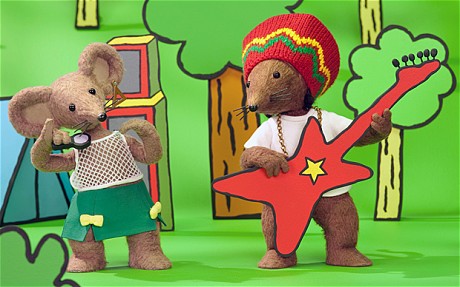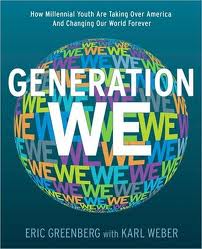 Last year saw the debut of a new children’s TV show in Britain, adapted from a successful series of children’s books, as a lot of kid’s TV is. The only trouble is that, rather than being yet another show about talking animals who repeat the same moral messages Sesame Street has done since 1969, this one aims for a more complex theme: spotlighting a particular ethnic community in Britain and looking at their culture. And from the show’s title alone, I’m sure you can guess which culture that might be. Say hello to Rastamouse.
Last year saw the debut of a new children’s TV show in Britain, adapted from a successful series of children’s books, as a lot of kid’s TV is. The only trouble is that, rather than being yet another show about talking animals who repeat the same moral messages Sesame Street has done since 1969, this one aims for a more complex theme: spotlighting a particular ethnic community in Britain and looking at their culture. And from the show’s title alone, I’m sure you can guess which culture that might be. Say hello to Rastamouse.
With a title like that it’s almost certain to cause ‘controversy’, but in an age of never-ending scandal such OTT reactions over everything become tiresome and embarrassing. Tiresome because surely everyone used up their lifetime quota of outrage sometime back in 2007, and embarrassing because Western society imbues every part of its mainstream culture with some enormous psychological influence that, one way or another, inevitably ends up in mass pogroms against some demographic or other. Or not, and such things have not happened for the best part of half a century. To think that a show aimed at children could somehow worsen the existing tensions between ethnic communities and the white majority is, plainly and simply, embarrassing.
But let’s start small. The main ‘controversy’ seems to come from the idea that Rastamouse is nothing more than a collection of racist stereotypes about the Caribbean community in Britain or anywhere else. The West Indian accents used by the voice actors are ‘inaccurate’. The mighty heritage of Rastafarianism is insulted by making the characters mice (when the traditional symbol of Rastafarianism is a lion). Now, keep in mind these criticisms when reading about the show’s actual content.
Rastamouse, himself, is the hero, the main protoagonist, not, as Caribbean-British commentator Davina Hamilton points out, just a goofy sidekick or comic relief. The show focuses on fighting crime, a tougher character than simply a show about wakcy hijinks. Rastafarianism, or anything affiliated with the tenets of the religion or culture, is never explicitly referenced, and this is certainly not a show soured with adult humour or innuendo. It’s a show about a crime-fighting mouse, who happens to love reggae music and have Afro-Caribbean roots. Does that sound racist or patronising in any way?
Remember, this is a programme for children, not some kind of drama or soap opera. It’s a series openly expressing the vibrancy and beauty of Caribbean music and culture. I, being the older brother of an elementary-school-age girl, have sat through every episode and not once did I find a truly offensive stereotype. Y’know, like smoking weed, gangland killings, voodoo, stuff that is actually offensive and negative, which, as I have myself no Afro-Caribbean roots, I can at least identify what might and might not be socially damaging. Since when is it a bad thing for Afro-Caribbeans to like reggae music or speak in their native accents, and why is it a bad thing for those elements to be screened to the nation’s children who would otherwise almost certainly not come into any contact with real Afro-Caribbean culture for most of their lives?
Not all stereotypes are negative. Do German people get pissed when we British constantly label them ‘efficient’? Do Latinos become enraged when a Meixcan-themed restaurant is made, mariachi music and all? Does Japan cry out when the West imitates the anime-style because it otherwise can’t compete with such awesomeness? You, the reader, can instantly identify the real negative stereotypes with these cultures and almost any other culture, but there obviously is a difference. And for kid’s TV, (positive) stereotypes are a quick and easy way to create something that children can easily remember and appreciate. Do the critics of Rastamouse desire to see him kill a gay character in reflection of Jamaica’s appalling record on LGBT rights? Or maybe he can make friends with someone from Grenada, who’s family was massacred by the US in 1983? Or how about Da Easy Crew channel their funding through the Cayman Islands, one of the world’s most secretive and destructive tax havens? These are complex issues that do not make for interesting or pleasant viewing for children, and neither do they have any relevance or significance to them, for the most part. Children want to see shows that are colourful, funny, thrilling and warm-hearted, stressing friendship and co-operation, and in Rastamouse‘s case helping solve problems in the community, because they know about these vague things called ‘right’ and ‘wrong’ but they need a little help telling the difference from people other than their friends and family for a change. And this is a very cute show, proving that, in TV terms, the British can make good programmes for kids.
But I recognise that all stereotypes, whether positive or negative, are ultimately simplifications of incredibly rich and diverse cultures and peoples and they should never be accepted as a shorthand for learning about someone else’s way of life. They reduce human beings to a bunch of cliches and histories of people and places to a few ignorant soundbites, and any critics of Rastamouse do indeed have a valid point in complaining about this. But that’s only because a TV programme can only last so long before the real world forces you to divert your attention back to it, and only so many things can be said in 10 minutes. And since this government is ravaging funding for arts and culture, it would seem that to have any kid’s show featuring as its hero someone who is neither white nor from a Western country is something to be grateful for as an acknowledgement that the Establishment does put its heart and its money in the right place every once in a while.
For the time being, Rastamouse remains one of the BBC’s most popular shows, even going onstage at last year’s Glastonbury Festival, so it seems there is a place for Rastamouse after all. It’s an important step on eradicating boundaries between peoples, bringing together children from parents who have a history of conflict with each other. If it can accomplish friendships in real life and a wider appreciation for the supreme awesomeness of reggae music, then surely at least that much is a good ting?




